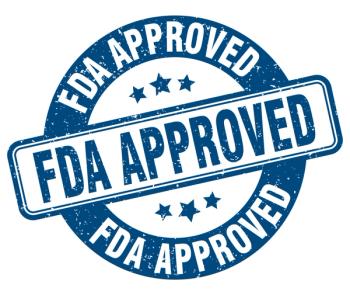
FDA OKs Azacitidine Tablets for Acute Myeloid Leukemia
Oral azacitidine (Onureg; Celgene) is approved for patients in first remission with acute myeloid leukeimia.
Officials with the FDA have approved azacitidine tablets (Onureg; Celgene) for continued treatment of patients with acute myeloid leukemia (AML) who achieved first complete remission (CR) or complete remission with incomplete blood count recovery (CRi) following intensive induction chemotherapy and are not able to complete intensive curative therapy, according to a press release.1
The approval was based on data from the phase 3 QUAZAR AML-001 clinical trial, which evaluated the efficacy of azacitidine tablets in patients who achieved CR or CRi with intensive induction chemotherapy with or without having received subsequent consolidation therapy. Results from the study showed a statistically significant and clinically meaningful improvement in overall survival (OS), the study’s primary end point.1,2
The study enrolled 472 patients aged 55 years or older. Patients were randomized to receive either azacitidine tablets 300 mg or a placebo orally on days 1 to 14 of each 28-day cycle, plus best supportive care.2
According to the results, the median OS was 24.7 months (95% CI: 18.7, 30.5) in the oral azacitidine arm and 14.8 months (95% CI: 11.7, 17.6) in the placebo arm (HR 0.69; 95% CI: 0.55, 0.86; p=0.0009). A subgroup analysis demonstrated consistency in OS benefit for patients in either CR or CRi.2
Overall, adverse effects in ≥10% of patients receiving azacitidine were nausea, vomiting, diarrhea, fatigue/asthenia, constipation, pneumonia, abdominal pain, arthralgia, decreased appetite, febrile neutropenia, dizziness, and pain in the extremity. Due to substantial differences in pharmacokinetic parameters, azacitidine tablets should not be substituted for intravenous or subcutaneous azacitidine, as it may result in a fatal adverse reaction.1,2
“Continued treatment with Onureg demonstrated an overall survival benefit in adults with AML who had achieved first complete remission in the QUAZAR AML-001 study and, notably, it has the potential to do this in a convenient manner, given its once daily oral formulation,” lead study investigator Andrew Wei, MBBS, PhD, Alfred Hospital and Monash University, Melbourne, Australia, said in a statement.2 “This approval should help establish continued treatment with Onureg as a standard component of AML therapy for adults who achieved first complete remission following chemotherapy and who cannot proceed to intensive curative therapy, like hematopoietic stem cell transplant.”
The recommended dose of azacitidine is 300 mg orally once daily with or without food on days 1 through 14 of each 28-day cycle. Continue azaciditine until disease progression or unacceptable toxicity.1
References
1. FDA approves Onureg (azacitidine tablets) for acute myeloid leukemia. News Release. FDA; September 1, 2020. Accessed September 3, 2020. https://www.fda.gov/drugs/resources-information-approved-drugs/fda-approves-onureg-azacitidine-tablets-acute-myeloid-leukemia.
2. US Food and Drug Administration Approves Onureg (azacitidine tablets), a New Oral Therapy, as Continued Treatment for Adults in First Remission with Acute Myeloid Leukemia. News Release. Bristol Myers Squibb; September 1, 2020. Accessed September 3, 2020. https://news.bms.com/press-release/corporatefinancial-news/us-food-and-drug-administration-approves-onureg-azacitidine-ta
Newsletter
Pharmacy practice is always changing. Stay ahead of the curve with the Drug Topics newsletter and get the latest drug information, industry trends, and patient care tips.























